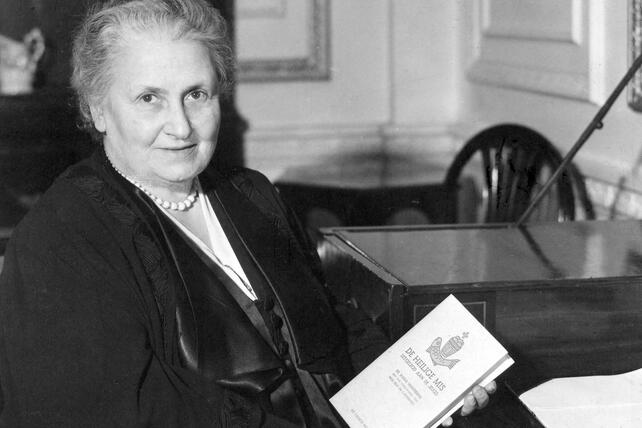Digital Repository Policy
Introduction
The Association Montessori Internationale (AMI) was founded in 1929 by Maria Montessori to maintain the integrity of her life’s work, and to ensure that it would be perpetuated after her death. AMI is the recognised international authority on Montessori education and is the custodian and cultivator of Montessori philosophy and pedagogy.
The work of humanity that always loves more, knows more and serves more, that penetrates more and more into details in order to become more and more interested, can be translated in the three words above—love, know and serve. This is the basis upon which human work ought to be founded.
Maria Montessori, The Child, Society and the World.
Policy
The Association Montessori Internationale (AMI) will preserve, secure and provide open access to digital data to ensure that the legacy and life’s work of Maria Montessori will be made available to the world in perpetuity.
AMI seeks to preserve both physical and digital records pertaining to this legacy and work.
AMI considers both born-digital materials and materials digitised from analogue originals to be within the scope of its digital repository.
AMI has established a policy and standards framework drawing from international best practices and consistent with international GLAM[i] institutions.
This framework will ensure that AMI’s preservation digitisation activities produce a digital copy which is an effective long-term surrogate for paper and analogue originals.
AMI supports UNESCO’s promotion of Open Access.
In undertaking this work AMI will be guided by the FAIR Guiding Principles, the TRUST principles, COAR best practice guidelines, the OAIS model and relevant ISO standards.
Guiding Principles
The following references provide guidance on best practices and industry standards.
The FAIR Guiding Principles[ii] for scientific data management and stewardship provide a starting point, to ensure:
1. Findability
2. Accessibility
3. Interoperability
4. Reuse
From this, and the subsequent Framework[iii], we undertake that metadata and data should be easy to find for both humans and computers. This data should be retrievable as open, free and suitable for as many universal applications as the data reasonably fits. The data should be able to be integrated with other data if applicable and be replicable for reuse into the future.
Another point of reference are the TRUST Principles[iv] for digital repositories, which specify the following set of guiding principles to identify digital repository trustworthiness:
| Principle | Guidance for Repositories |
| Transparency | To be transparent about specific repository services and data holdings that are verifiable by publicly accessible evidence. |
| Responsibility | To be responsible for ensuring the authenticity and integrity of data holdings and for the reliability and persistence of its service. |
| User Focus | To ensure that the data management norms and expectations of target user communities are met. |
| Sustainability | To sustain services and preserve data holdings for the long-term. |
| Technology | To provide infrastructure and capabilities to support secure, persistent, and reliable services. |
The following objectives for best practices for digital repositories were identified by COAR[v]:
1. Discovery
2. Access
3. Reuse
4. Integrity and authenticity
5. Quality assurance
6. Privacy of sensitive data
7. Preservation
8. Sustainability and governance
AMI supports UNESCO’s promotion of Open Access[vi]—the online availability of scholarly information to everyone, free of most licensing and copyright barriers—for the benefit of global knowledge flow, innovation and socio-economic development.
Reference was also sought from the Open Archival Information System (OAIS)[vii] model, which is applicable to organisations with the responsibility of making information available for long-term preservation. This model is now enshrined in ISO 14721:2012[viii].
The following ISO Standards were referenced for AMI digital repository polices, standards and procedures:
- ISO 15489-1:2016[ix] Information and documentation — Records management — Part 1: Concepts and principles;
- ISO 23081-1:2006[x] Information and documentation — Records management processes — Metadata for records — Part 1: Principles;
- ISO 23081-2:2009[xi] Information and documentation — Managing metadata for records — Part 2: Conceptual and implementation issues;
- ISO/IEC 11179-1:2015[xii] Information technology — Metadata registries (MDR) — Part 1: Framework
Annual Review
We are committed to reviewing our policies and good practices annually.
This policy was last reviewed on 28 February 2024.
References
[ii] Wilkinson, M., Dumontier, M., Aalbersberg, I. et al. The FAIR Guiding Principles for scientific data management and stewardship. Sci Data 3, 160018 (2016). https://doi.org/10.1038/sdata.2016.18
[iv] Lin, D., Crabtree, J., Dillo, I. et al. The TRUST Principles for digital repositories. Sci Data 7, 144 (2020). https://doi.org/10.1038/s41597-020-0486-7
[v] Confederation of Open Access Repositories (COAR) Community Framework for Good Practices in Repositories https://www.coar-repositories.org/coar-community-framework-for-good-practices-in-repositories/
[vi] UNESCO Open Access statement: https://www.unesco.org/en/open-access#:~:text=An%20open%20door%20to%20UNESCO's%20knowledge&text=Open%20Access%20means%20free%20access,to%20the%20dissemination%20of%20knowledge.
[vii] The Consultative Committee for Space Data Systems Reference Model for an Open Archival Information System (OAIS) https://public.ccsds.org/Pubs/650x0m2.pdf
[viii] ISO 14721:2012 https://www.iso.org/standard/57284.html
[ix] ISO 15489-1:2016 https://www.iso.org/obp/ui/#iso:std:iso:15489:-1:ed-2:v1:en
[x] ISO 23081-1:2006 https://www.iso.org/obp/ui/#iso:std:iso:23081:-1:ed-1:v1:en
[xi] ISO 23081-2:2009 https://www.iso.org/obp/ui/#iso:std:iso:23081:-2:ed-1:v1:en
[xii] ISO/IEC 11179-1:2015 https://www.iso.org/obp/ui/#iso:std:iso-iec:11179:-1:ed-3:v1:en
